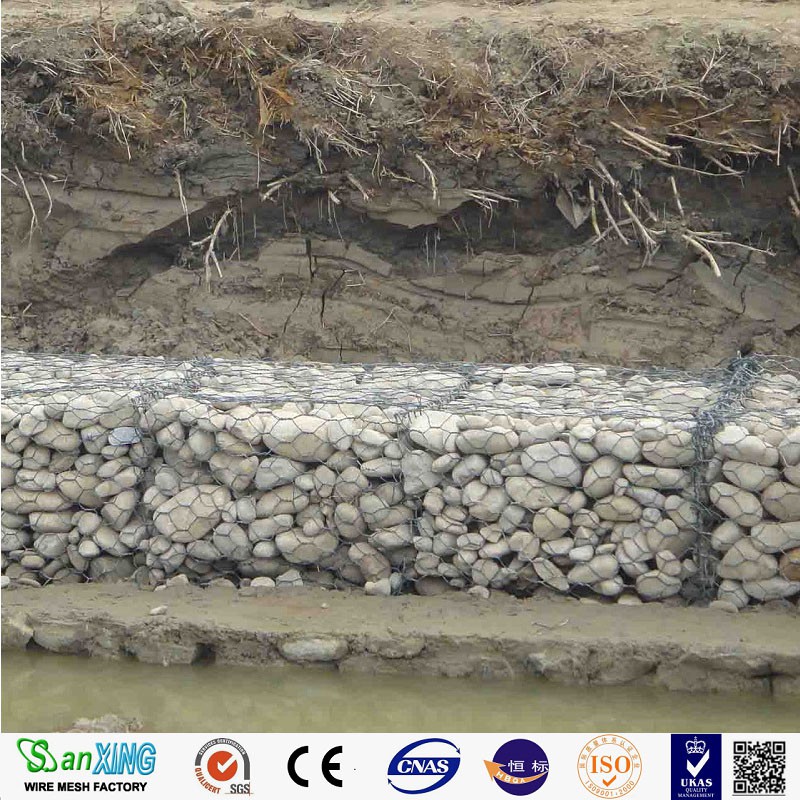Gabion Mesh,Gabion Wire Mesh,Galvanized Gabion Mesh,Gabion Basket Mesh,Pvc Coated Gabion Mesh
Gabions & Reno Mattresses are rectangular baskets made of heavily galvanized, double twisted, steel Woven Wire Mesh. The single unit constructed baskets are assembled, laced together and then filled with stone to form a monolithic structure. Gabions and Reno mattresses are used for retaining walls, sound barriers, channel linings, slope stabilization, dams and weirs. They are particularly effective in restoring the environment and promoting vegetation growth.
Plastic coated wire, Galvanized Wire stone cage wire mesh, is not only used as the stone net cage, but also as the high quality construction materials. widely used in highways, railways, greening Fence hillside net cage, flood fighting net cage, revet fence, zoo fence, well and alley fence etc. Meanwhile it can improve the stability of hillside, preventing the riverbed from washing out.On the maintenance of neighborhood environment and waterhead, it also have the effect of controlling the flowing quantity,preventing the watersource from flowing, protecting and governing the zoology environment.
Gabion Mesh,Gabion Wire Mesh,Galvanized Gabion Mesh,Gabion Basket Mesh,Pvc Coated Gabion Mesh Anping Sanxing Wire Mesh Factory , https://www.anpingsanxingwiremesh.com
JP Morgan recently pointed out that China’s coal import pace has accelerated once again. In the face of production constraints brought about by the rationalization of small-scale coal mines, China will become a net importer of coal for the first time this year. At the same time, coal prices will further increase in the fourth quarter.
Under the background of increasing China’s coal imports, domestic companies have begun to go overseas to seek overseas coal investment to protect the supply of domestic power plant coal.
On October 27, CIC announced that it had spent US$500 million to purchase the 30-year senior secured convertible bonds issued by Canada’s SouthGobi Energy Co., Ltd. Twelve months after the issuance of the convertible bonds, CIC has the right to transfer shares in whole or in part and the conversion price is set at 11.88 Canadian dollars. If CIC has all converted shares at this price, it will get a 22% stake in SouthGobi.
The main business of SouthGobi is the exploitation of electricity coal in Mongolia. The main target market is Gansu, China. It is worth noting that China Investment Corporation and SouthGobi have set up a "gambling" clause. A subsidiary of CIC will provide SouthGobi with coal sales, procurement and logistics services. If SouthGobi’s coal sales volume is less than 10 million tons within the first five years of cooperation, the subsidiary of CIC shall be compensated.
Similar to CIC's investment in South Gobi in the Gansu thermal coal market, in July this year, Huaneng, one of the largest domestic power generation groups, also announced its intention to bid for a 51% stake in PT BERAU COAL, Indonesia's fifth-largest coal company, to connect Huaneng's domestic power plants.
Although Huaneng Group had several successful overseas acquisitions before this time, if this bid succeeds, Huaneng will be the first single for China's power plants to obtain overseas coal source control. A person from the Huaneng Group earlier said in an interview with this newspaper: “Unlike the Australia project and the Singapore Tuas Energy M&A case, the Indonesia project will be able to effectively connect with Huaneng’s domestic power plants instead of purely international operations. Prior to this, the coal mine It is already Huaneng's imported coal supplier."
"It should be said that many domestic power companies have such intentions, but it is still very difficult to obtain overseas coal mines from the current point of view, but this is a direction of efforts to protect the stability of coal imported from overseas." Finally indicated.

China will become a net coal importer for the first time Coal prices will rise in the fourth quarter
According to public statistics, at present, the coal inventory at Qinhuangdao Port (which accounts for approximately half of China's total seaborne coal shipments) has hovered around 4 million tons, which is significantly lower than the average level of 5.4 million tons in the first half of 2009.